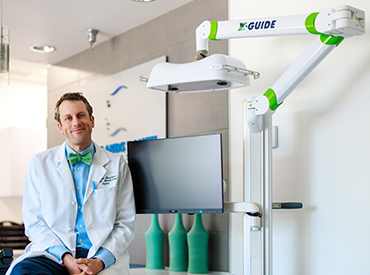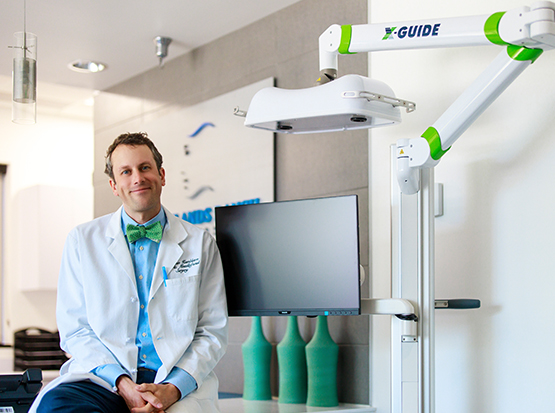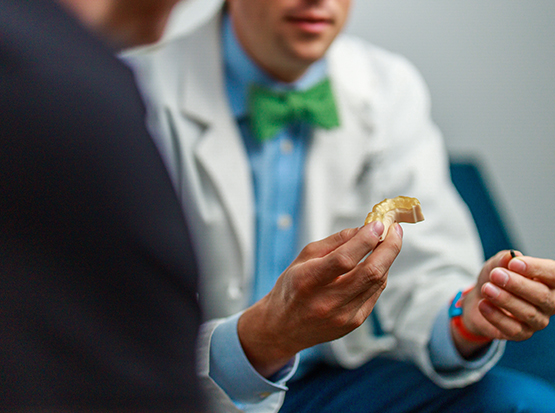 Considering dental implants is a major step toward restoring your smile and improving your oral health, so you want to ensure that you have all the necessary information to make an informed decision. It is a surgical procedure, so you will want to understand how to prepare, what the process entails, and what to expect during recovery.
Considering dental implants is a major step toward restoring your smile and improving your oral health, so you want to ensure that you have all the necessary information to make an informed decision. It is a surgical procedure, so you will want to understand how to prepare, what the process entails, and what to expect during recovery.
Remember that your oral surgeon wants you to feel as comfortable as possible with your decision and the dental implant procedure. Asking questions is part of that process, so do not be afraid to bring up any concerns you may have or things you want more information about.
Here are a few questions to get you started as you begin the consultation process for dental implants:
1. Am I a good candidate for dental implants?
Many patients are eligible for dental implants, even if they do not have the best oral health. Ideally, you should have healthy gums and adequate bone density, but periodontitis can be treated, and bone loss can be addressed using a bone graft. Your oral surgeon can prepare your mouth for dental implant surgery to make the procedure as successful as possible.
You will want to let your oral surgeon know upfront if you have a chronic condition such as diabetes or if you have had radiation to the head or neck. This could affect your candidacy and increase the risk of complications. Your oral surgeon will carefully consider your situation and let you know if dental implants are a good option or not.
2. Are dental implants safe?
Dental professionals have been performing dental implant surgery for more than 50 years. The five-year success rate for implants is 99%, and the 10-year success rate is 98%. For most patients, they are very safe when the procedure is performed by a trained professional.
The actual implant is typically made of titanium, which is a biocompatible material. It does not easily corrode, and it will fuse with the natural bone to form a strong bond. Your oral surgeon will discuss potential risk factors such as having diabetes or cancer in order to decide if dental implants are right for you.
3. How much experience do you have?
Dental implant surgery is a major procedure, so you want to ensure that the professional performing the work is well-trained and experienced in placing implants. It is appropriate to ask what their training background is, how many procedures they have performed, and their success rate. You may also want to see if they have before and after pictures that you can look at.
4. How long does the procedure take?
This will vary depending on each person’s situation. If your gums are healthy and you have adequate jaw bone structure, placing a single implant takes about 30 to 60 minutes, while placing multiple implants takes two to three hours. If you need a bone graft, this may be done prior to placing the implants to give the bone time to fuse, or it may be done at the same time as the implants. This can also affect the amount of time for the procedure. You may require multiple appointments, depending on your needs.
5. Are there any drawbacks to getting dental implants?
One of the biggest challenges with getting dental implants is being patient after the procedure and waiting for the implants and bone to fuse. This process takes about three months, so during this time, you will be limited to eating soft foods. You may receive a temporary crown or dentures, but you will not be able to bite and chew with them yet.
However, once the implant and bone fuse, permanent replacement teeth will be attached, and you can use them just like your natural teeth. They are strong, stable, and securely affixed – no removing them at night for cleaning. If you can be patient during the recovery process, dental implants can be a long-term solution to missing teeth and allow you to eat all of the foods you enjoy.
6. What makes dental implants a better choice than other options?
Because dental implants are placed directly into the jaw bone, and then that bone integrates with the implant, it makes them a strong, long-lasting solution for missing teeth. Unlike traditional dentures or bridges, they do not need to be removed daily for cleaning. Once the tooth or implant-retained denture is attached to the implant, it is cared for just like a natural tooth and blends in with existing teeth.
Dental implants can also last a lot longer than other options and may be more durable. In addition, because of where they are placed, they help to stimulate the jaw bone and reduce the risk of bone loss. This can not only preserve facial structure but also help to keep remaining teeth in place.
7. How long do dental implants last?
With proper care, dental implants can last 25 years or more. Depending on how old you are when you get them, they could essentially last for the rest of your life. The lifespan of the dental implant can vary depending on how well it is placed and if it has fused, as well as how you treat it. For instance, using your teeth to open a bottle is not recommended; regular brushing, flossing, and dental check-ups are.
The titanium implant can last longer than the replacement tooth. Crowns can wear down after years of wear and tear and are susceptible to damage such as cracking. You may need your crowns replaced every 10 to 15 years. The same applies to implant-retained dentures. After several years, they may need to be repaired or replaced.
8. Can dental implants be removed?
One of the reasons that many patients prefer dental implants is that they are non-removable. You do not have to worry about taking them out at night for cleaning or using an adhesive to get them to stay in place. Implants are attached to the bone, and they are only removed if needed by your dentist or oral surgeon.
9. Is sedation used during dental implant surgery?
The oral surgeon will administer a local anesthetic to numb the area where the implant will be placed. This will keep you from feeling any pain during the surgery, though you may feel some pressure when the hole is drilled for the implant.
If you are anxious or nervous about the procedure, your oral surgeon can offer a variety of sedation options ranging from twilight anesthesia to full anesthesia. You will not be fully conscious during surgery, but you will regain alertness a short time later after the anesthesia wears off. A local anesthetic is still administered even if sedation is used because it temporarily blocks the pain receptors.
10. How do I prepare for dental implant surgery?
First and foremost, you will want to talk everything through with your dentist and oral surgeon so that you have a solid plan for dental implant surgery. They can provide you with all of the details for how to prepare. Some common guidelines include:
- Not eating or drinking anything (including water) for at least eight hours before surgery if you are receiving anesthesia. (You do not want to have anything in your stomach in case the anesthesia makes you nauseous.)
- Have a family member or friend drive you to the appointment because you will not be allowed to drive yourself home after being sedated.
- Notify the oral surgeon’s office if you are sick or not feeling well before surgery.
- Take any antibiotics the doctor may have prescribed before the procedure, and use an antibacterial mouth rinse if recommended.
- Wear loose, comfortable clothing.
11. How long does recovery take?
This will vary from patient to patient. You should feel relatively back to normal within a few days. During the first few days, you may have some minor swelling, bruising, or bleeding, but that will subside. You should take the prescribed antibiotics to prevent infection and can use over-the-counter pain relievers to minimize swelling and discomfort. You should also limit any strenuous activity for several days to avoid disturbing the wound.
Remember that it will take about three months for the implant and bone to fuse and the replacement tooth to become fully functional. You should limit your diet to only liquids and soft foods for the first few days. As healing continues, you can return to a normal diet while being cautious not to put any strain directly on the implant. In general, you should avoid foods that are crunchy, tough, or sticky as they can interfere with the healing process.
12. Is there anything I cannot eat with dental implants?
Once osseointegration has occurred, and your implants have integrated with the jaw bone, you can return to eating all of the foods that you enjoy. There are no specific limitations on what you can and cannot eat, as replacement teeth act just like your natural teeth and are held firmly in place by the implant. Even implant-retained dentures are secure and will not slip when eating different foods.
13. How much do dental implants cost?
This varies from patient to patient. Some of the factors that go into determining the cost for Highlands Ranch patients include:
- The number of implants needed.
- The type of implant used.
- Whether or not any tooth extractions are necessary prior to implant surgery.
- Where in the mouth, the implants will be placed.
- Whether bone grafting or other procedures are necessary.
- How complex the procedure is given the individual’s situation.
- Whether or not dental insurance will help cover costs.
Once your oral surgeon has conducted a full exam of your teeth and gums, they can determine how much work is necessary and create a plan for dental implants. At this point, they will be able to give you a more accurate estimate of the cost involved.
14. Does insurance cover dental implants?
This will depend on your individual dental insurance plan. Some plans will cover at least part of the cost of implants if they are for cosmetic reasons. Often insurance will pay more if the implants are needed following trauma, injury, or an accident. You will have to check with your provider to understand eligibility and what your portion of the expense will be.
Preparing for Your Appointment
Before your first appointment with the oral surgeon, jot down any initial questions that you have so that you do not forget. You may also want to bring a notebook or pad of paper to the appointment with you so you can take notes on what the oral surgeon says. It can be a lot of information to take in at once. Bringing a family member or friend along, if possible, can also be a good idea so that someone else is listening, and you can go back and discuss what was said after the appointment.
In the time leading up to additional appointments and your procedure, keep a running list of other questions you think of. Do not be afraid to ask about anything that is on your mind; your oral surgeon is happy to answer questions to help you feel more confident about the whole process. There are no “wrong” questions because everyone processes information differently and has varied inquiries that they want to know or are concerned about.
Choose Dr. Hambleton for Dental Implants in Highlands Ranch, CO
Dr. Hambleton has extensive training and experience helping patients in Highlands Ranch and the Denver area to improve their oral health and revitalize their smiles.
If you are ready to talk about dental implants and why they may be a viable option for you, contact Highlands Ranch Oral & Facial Surgery today.




